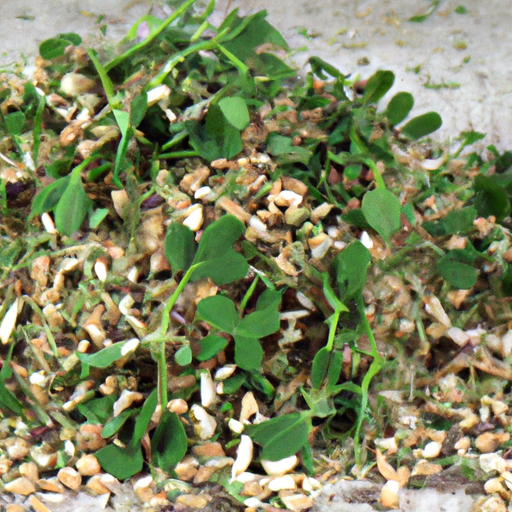Health Benefits Of Alfalfa

How Alfalfa Can Help Improve Digestive Health
If you’re looking for a natural way to improve your digestive health, alfalfa may be the answer! This nutrient-rich plant has been used for centuries to help with a variety of digestive issues, and it’s still a popular choice today. Here’s what you need to know about alfalfa and how it can help improve your digestive health.
Alfalfa is a nutrient-dense plant that’s packed with vitamins, minerals, and other beneficial compounds. It’s high in fiber, which helps to keep your digestive system running smoothly. It also contains plant compounds that can help reduce inflammation in the gut, which can help with digestive issues like irritable bowel syndrome (IBS).
Alfalfa is also a great source of probiotics, which are beneficial bacteria that help keep your gut healthy. Probiotics can help improve digestion, reduce bloating, and even boost your immune system.
Alfalfa is also rich in antioxidants, which can help protect your gut from damage caused by free radicals. This can help reduce inflammation and improve your overall digestive health.
Finally, alfalfa is a great source of plant-based protein, which can help keep your digestive system running smoothly. Protein helps to break down food and absorb nutrients, so it’s important for good digestive health.
If you’re looking for a natural way to improve your digestive health, alfalfa is a great choice. It’s packed with beneficial nutrients and compounds that can help reduce inflammation, improve digestion, and boost your immune system. Try adding alfalfa to your diet today and see how it can help improve your digestive health!
The Role of Alfalfa in Lowering Cholesterol Levels
If you’re looking for a natural way to lower your cholesterol levels, you may want to consider adding alfalfa to your diet. Alfalfa is a nutrient-rich plant that has been used for centuries to treat a variety of ailments, including high cholesterol.
Alfalfa is a type of legume that is high in fiber, vitamins, minerals, and antioxidants. It is also a good source of plant sterols, which are compounds that can help reduce cholesterol levels. Studies have shown that consuming alfalfa can help reduce total cholesterol, LDL (“bad”) cholesterol, and triglycerides.
So how can you incorporate alfalfa into your diet? Alfalfa sprouts are a great way to get the benefits of alfalfa. You can add them to salads, sandwiches, and wraps. You can also buy alfalfa supplements in capsule or tablet form.
If you’re looking for a tasty way to get your daily dose of alfalfa, try making a smoothie with alfalfa sprouts, banana, almond milk, and honey. You can also add alfalfa to soups, stews, and casseroles.
In addition to helping lower cholesterol levels, alfalfa may also help reduce inflammation, improve digestion, and boost your immune system. So if you’re looking for a natural way to improve your health, adding alfalfa to your diet is a great place to start.
Exploring the Anti-Inflammatory Benefits of Alfalfa
If you’re looking for a natural way to reduce inflammation, alfalfa may be the answer! This humble plant has been used for centuries to treat a variety of ailments, and its anti-inflammatory properties are now being studied more closely. Here’s what you need to know about the potential benefits of alfalfa for reducing inflammation.
Alfalfa is a type of legume that is native to the Middle East and parts of Asia. It is a rich source of vitamins, minerals, and other nutrients, including vitamins A, C, E, and K, as well as calcium, magnesium, and potassium. It also contains a variety of phytochemicals, including saponins, flavonoids, and phytoestrogens.
Studies have shown that alfalfa has anti-inflammatory properties. In one study, alfalfa extract was found to reduce inflammation in mice with arthritis. Another study found that alfalfa extract was able to reduce inflammation in human cells.
Alfalfa is also a rich source of antioxidants, which can help protect your body from damage caused by free radicals. Free radicals are molecules that can damage cells and lead to inflammation. Antioxidants can help neutralize these molecules and reduce inflammation.
Alfalfa is also a good source of dietary fiber, which can help reduce inflammation by promoting healthy gut bacteria. A healthy gut microbiome is important for reducing inflammation and promoting overall health.
Finally, alfalfa is a good source of plant-based proteins, which can help reduce inflammation by providing your body with essential amino acids. Amino acids are the building blocks of proteins, and they are essential for reducing inflammation.
If you’re looking for a natural way to reduce inflammation, alfalfa may be the answer. It is a rich source of vitamins, minerals, antioxidants, dietary fiber, and plant-based proteins, all of which can help reduce inflammation. So, why not give it a try?
The Role of Alfalfa in Boosting Immunity
Alfalfa is a powerhouse of nutrition and has been used for centuries to boost immunity and overall health. It’s packed with vitamins, minerals, and antioxidants that can help keep your body strong and healthy.
Alfalfa is a great source of vitamins A, C, E, and K, as well as minerals like calcium, magnesium, and potassium. It also contains a variety of phytonutrients, including lignans, saponins, and phytoestrogens. These compounds have been shown to have anti-inflammatory, antioxidant, and immune-boosting properties.
Studies have shown that alfalfa can help boost the immune system by increasing the production of white blood cells, which are responsible for fighting off infection and disease. It can also help reduce inflammation, which can help reduce the risk of certain illnesses.
Alfalfa is also a great source of dietary fiber, which can help keep your digestive system healthy and functioning properly. This can help your body absorb nutrients more efficiently and can also help reduce the risk of certain diseases.
In addition to its immune-boosting benefits, alfalfa can also help improve your overall health. It’s a great source of protein, which can help build and maintain muscle mass. It’s also a good source of essential fatty acids, which can help reduce cholesterol levels and improve heart health.
Alfalfa is easy to incorporate into your diet. You can add it to salads, soups, smoothies, and other dishes. You can also take it in supplement form, which is a convenient way to get all the benefits of alfalfa without having to eat it every day.
If you’re looking for a natural way to boost your immunity and overall health, alfalfa is a great option. It’s packed with vitamins, minerals, and antioxidants that can help keep your body strong and healthy. So, why not give it a try?
How Alfalfa Can Help Manage Blood Sugar Levels
If you’re looking for a natural way to help manage your blood sugar levels, alfalfa may be the answer! This humble plant has been used for centuries to help support healthy blood sugar levels, and it’s easy to incorporate into your diet.
Alfalfa is a nutrient-dense plant that’s packed with vitamins, minerals, and antioxidants. It’s also a great source of dietary fiber, which helps slow down the absorption of sugar in the bloodstream. This can help keep your blood sugar levels stable and prevent spikes and dips.
Alfalfa is also rich in chlorophyll, which has been shown to help reduce the amount of sugar that’s absorbed from the digestive tract. This can help keep your blood sugar levels in check.
In addition to its blood sugar-regulating properties, alfalfa is also a great source of plant-based protein. This can help keep you feeling full for longer, which can help prevent overeating and cravings for sugary snacks.
There are lots of ways to incorporate alfalfa into your diet. You can add it to salads, soups, and smoothies, or you can take it in supplement form. It’s also available in powder form, which can be added to drinks or sprinkled on food.
If you’re looking for a natural way to help manage your blood sugar levels, alfalfa may be the answer. Incorporating this nutrient-dense plant into your diet can help keep your blood sugar levels stable and prevent spikes and dips. Give it a try and see how it works for you!





